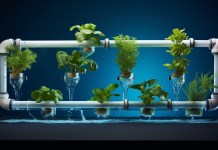Microbes play a vital role in hydroponics, the practice of growing plants without soil. We explore the essential role of microbes in hydroponics and how they contribute to the success of this innovative gardening method.
From nutrient cycling and enhancing plant health to promoting crop quality, understanding and harnessing the power of these microscopic organisms is crucial for achieving optimal results in hydroponic systems.
Join us as we delve into the world of microbes in hydroponics.
The Benefits of Microbial Breakdown in Hydroponics
One of the key advantages of microbial breakdown in hydroponics is the efficient recycling of nutrients, leading to increased plant growth and productivity.
Microbes play a crucial role in hydroponic systems:
- by breaking down organic matter
- by converting it into forms to be absorbed by plants
This process is facilitated by microbial diversity, as different types of microbes specialize in breaking down specific organic compounds.
Additionally, microbial symbiosis occurs when beneficial microbes form mutually beneficial relationships with plants, enhancing nutrient uptake and overall plant health.
Nutrient Cycling: How Microbes Support Hydroponic Systems
Microbes break down organic matter and convert it into forms plants can readily absorb. They play a crucial role in supporting hydroponic systems by cycling nutrients.
- Microbial diversity: In hydroponic systems, a diverse community of microbes is essential for efficient nutrient cycling. Different types of microbes have specific roles in breaking down organic matter and releasing nutrients for plant uptake. The presence of a diverse microbial community ensures that all necessary nutrients are made available to the plants.
- Nitrogen fixation: Nitrogen is a vital nutrient for plant growth, and microbes can fix atmospheric nitrogen into a form that plants can use. Rhizobium and Azotobacter bacteria can convert atmospheric nitrogen into ammonia, making it available for plants. In hydroponic systems with limited nutrient supply, this nitrogen fixation process becomes crucial.
- Nutrient recycling: Microbes aid in the recycling of nutrients within hydroponic systems. They break down dead plant material and convert it into organic matter, releasing nutrients such as phosphorus and potassium back into the system. This nutrient recycling process ensures that the hydroponic system remains sustainable and nutrient-rich for plant growth.
Enhancing Plant Health With Beneficial Microbes
The presence of beneficial microbes within hydroponic systems contributes to the enhancement of plant health by fostering symbiotic relationships and providing essential nutrients.
Beneficial microbe application in hydroponics involves the intentional introduction of specific microbes into the growing system. These microorganisms, such as bacteria and fungi, colonize the plant roots and form symbiotic relationships that benefit both the plants and the microbes.
The microbes help the plants by improving nutrient uptake, promoting root growth, and protecting against pathogens. In return, the plants provide the microbes with organic compounds as a source of energy.
Additionally, microbial diversity plays a crucial role in enhancing plant health in hydroponics. A diverse microbial community can provide a wide range of beneficial functions, ensuring optimal nutrient cycling and disease suppression.
Therefore, incorporating beneficial microbes and promoting microbial diversity is essential for maximizing plant health and productivity in hydroponic systems.
The Role of Microbes in Promoting Crop Quality in Hydroponics
Microbes play a vital role in promoting crop quality in hydroponics by influencing plant metabolism and enhancing nutrient uptake. A diverse microbial community in the hydroponic system has been found to positively impact plant growth and development.
Here are three ways in which microbes contribute to promoting crop quality in hydroponics:
- Microbial diversity: A higher diversity of microbes in the hydroponic system can improve plant health and resilience. Different microbial species perform various functions, such as nutrient cycling, disease suppression, and hormone regulation, which collectively enhance crop quality.
- Plant-microbe interactions: Beneficial microbes establish symbiotic relationships with plants, facilitating the exchange of nutrients and growth-promoting compounds. These interactions result in improved nutrient uptake, enhanced root development, and increased resistance to pests and diseases.
- Enhanced nutrient availability: Microbes play a crucial role in breaking down organic matter and releasing nutrients in forms that are readily available for plant uptake. This availability of essential nutrients ensures optimal plant growth and ultimately leads to high-quality crops.
Understanding the role of microbes in promoting crop quality is essential for harnessing their power for successful hydroponic gardening.
Harnessing the Power of Microbes for Successful Hydroponic Gardening
By understanding the mechanisms through which microbes contribute to plant health and growth, hydroponic gardeners can effectively harness the power of these microorganisms for successful gardening. One way to do this is through the use of microbial inoculants, which are mixtures of beneficial microorganisms that can be added to the hydroponic system. These inoculants can help to improve nutrient uptake, enhance disease resistance, and promote overall plant growth. Additionally, maintaining microbial diversity in the hydroponic system is crucial for its success. You can achieve this by ensuring the system has a variety of microbial species. Use organic fertilizers, compost teas, and regularly monitor the microbial population to maintain it. Overall, harnessing the power of microbes can greatly enhance the success of hydroponic gardening.
| Advantages of Microbial Inoculants | Benefits of Microbial Diversity |
|---|---|
| Improve nutrient uptake | Enhance disease resistance |
| Promote overall plant growth | Maintain system stability |
| Increase nutrient availability | Enhance nutrient cycling |
How are Microbes Introduced?
1. Commercial Microbial Products:
You can purchase specially formulated microbial products that are designed for hydroponic systems. These products contain a mix of beneficial microbes that can help in establishing a balanced microbial community.
2. Compost Tea:
Compost tea, a water-based extraction from compost, is rich in diverse microbial life. You can brew your own compost tea and introduce it into the hydroponic system.
Ensure that the compost used is well-aged and from a reliable source to avoid introducing pathogens.
3. Using Microbe-Enriched Media:
Some growing media come pre-inoculated with beneficial microbes. Using such media can help in introducing microbes to the system.
Coco coir, for instance, often harbors beneficial trichoderma fungi.
4. Worm Castings:
Worm castings are rich in microbes and can be added in small amounts directly to the hydroponic system or used in making compost tea.
Ensure that worm castings are from a clean and reliable source.
5. Beneficial Inoculants:
Specific beneficial microbes, such as mycorrhizal fungi and rhizobacteria, are available as inoculants. They can be applied directly to the plant roots or growing media.
6. Aerated Water:
Aeration can help in promoting microbial life. Using aerated water can encourage the growth and multiplication of aerobic beneficial microbes.
Ensure that the water used is clean and free from contaminants.
Best Practices:
Ensure Cleanliness: Make sure that the equipment and water used are clean to prevent the introduction of harmful pathogens along with the beneficial microbes.
Avoid Chemicals: Any use of harsh chemicals or sterilizing agents will adversely affect microbial life.
Consider Compatibility: Ensure that the microbes being introduced are compatible with the plants being grown and the overall system.
Key Takeaways
- Microbial diversity is crucial for efficient nutrient cycling in hydroponic systems.
- Beneficial microbes colonize plant roots and enhance nutrient uptake and root growth.
- Microbes play a protective role by defending plants against pathogens.
- Microbial breakdown of organic matter releases nutrients for optimal plant growth.
Conclusion
In conclusion, the essential role of microbes in hydroponics cannot be underestimated. They play a crucial role in breaking down organic matter, cycling nutrients, and promoting plant health.
Additionally, microbes contribute to the overall quality of crops in hydroponic systems. Harnessing the power of beneficial microbes is key to successful hydroponic gardening.
Please see our supporting article:
How Ph Affects Microbial Activity


